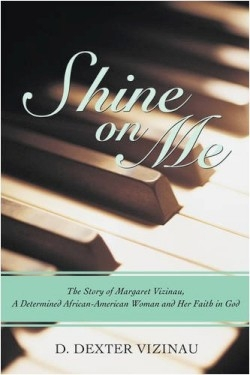Shine on Me
The Story of Margaret Vizinau, a Determined African-American Woman and Her Faith in God
Helen Keller, an icon of American history, was a woman of intelligence, discipline, and ambition who made a significant impact on society in spite of being born blind and deaf. It is good to remember that others have faced similar circumstances and succeeded as well. Margaret Vizinau was one. An African-American born in segregated rural Arkansas, Vizinau became a celebrated singer and choir director in San Francisco. Her blindness from birth adds an extra dimension to her accomplishments.
This biography, written by her son, offers an intimate view of her journey. Its title, Shine on Me, comes from the words of a hymn and reflects Margaret’s constant belief that God graced her life.
Born in 1927 to a relatively prosperous African-American couple, Margaret was nourished by a loving extended family. Her life changed when her father was killed in a sawmill accident and her mother remarried. The family was lured to San Francisco, where Margaret’s stepfather became a sanitation worker.
Margaret soon entered the College for the Blind at Berkeley where her innate musical gifts for voice and the piano flowered. There she met her first husband, Duane Vizinau, the son of a Native American man and a woman of Nordic heritage. As one might expect, skin color seemed to make little difference in such an environment. The marriage floundered after the author and his younger brother were born. Vizinau apparently preferred to exist on a small pension rather than to employ his significant intellect and musical gifts.
Much of Margaret’s early story is told in dialogue, which differentiates it from traditional biography. Readers will delve into words spoken by third and fourth parties with the understanding that these conversations are recreations of family tales.
A more serious flaw occurs when the author, entering his teenage years, begins to focus on his own life and shuffles his mother’s activities to the background. Shine on Me then becomes a coming-of-age tale, featuring Motown music, Panama Red and Acapulco Gold, girls riding the wave of the late 1960s’ sexual revolution, with Malcolm X, the Black Panthers, and the death of Martin Luther King, Jr. as a backdrop.
It is during this period that Margaret’s lot grows worse. While recovering from a broken arm, she is accidentally shot by her second husband, Leon Evans, a longshoreman, sometimes preacher, and sometimes drinker, when he attempts to frighten her by holding a shotgun in front of her sightless eyes and shouting “Boom.” Margaret loses a finger, and thus her ability to play the piano with her former proficiency, and wounds to her face and neck greatly curtail her singing ability. She comes to believe that a miracle has restored her ability, but it is not wholly so, and she is never again the choir director or featured soloist at prestigious churches.
As Margaret’s story fades away, the author relates the high points of his adult life, one he redeemed from his early missteps into drug use, skirt-chasing, and hustlin’ for dollars.
Shine on Me works well as a social history and a study of a particular segment of society in a particular time and place. There is much to admire in the story of Margaret Hinton Vizinau, a child of the ugly Jim Crow south, who grew up to play a vital artistic role in a cosmopolitan community.
Disclosure: This article is not an endorsement, but a review. The publisher of this book provided free copies of the book and paid a small fee to have their book reviewed by a professional reviewer. Foreword Reviews and Clarion Reviews make no guarantee that the publisher will receive a positive review. Foreword Magazine, Inc. is disclosing this in accordance with the Federal Trade Commission’s 16 CFR, Part 255.

